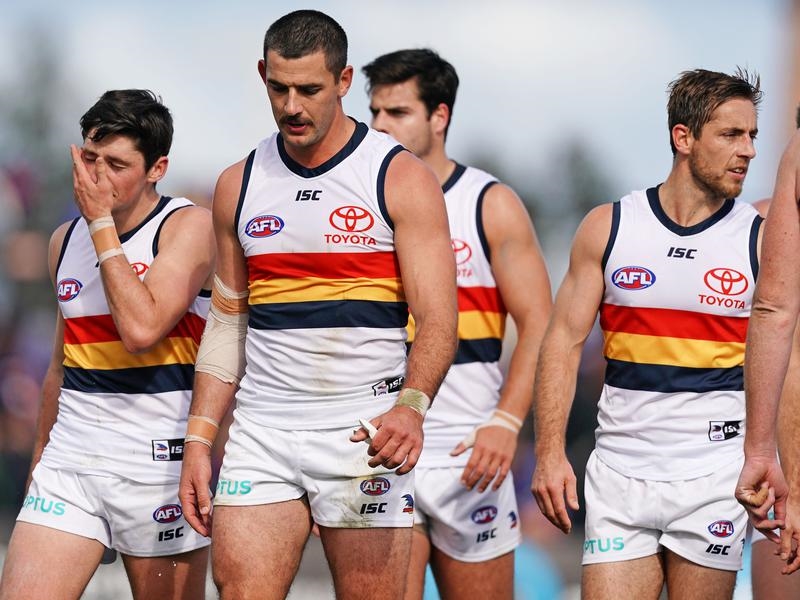
Phil Walsh likened coaching AFL club Adelaide to Formula One racing.
“We can all drive a car. But we can’t drive in Formula One,” Walsh said in 2015.
“It’s Formula One football. It’s played at a massive speed with great risks. Not everyone can do it.”
Four years on, the wheels have fallen off and the Crows are banged up.
Don Pyke has jumped from the driver’s seat, quitting as coach.
Taylor Walker’s foot is off the pedal, stepping down as co-captain.
Chairman Rob Chapman wants to take his hands off the wheel – he’d be gone already if not for the 2017 death of his preferred successor, Bob Foord, but for now remains buckled in.
A batch of players – Eddie Betts, Josh Jenkins, Sam Jacobs, Alex Keath, Hugh Greenwood, Riley Knight, Cam Ellis-Yolmen – loom as second-hand trades.
An external review is accelerating heat on Adelaide’s football department headed by Brett Burton.
The club’s most influential figure, Mark Ricciuto – board member, ex-captain, Adelaide’s sole Brownlow medallist – says he’ll stand aside if the review finds he’s part of the engine problems.
The review findings aren’t expected for at least a fortnight.
In the meantime, Ricciuto is set to be among a panel tasked with finding a new coach.
And he’s on a list management committee with Burton and others, charged with finding polish for an aged model.
Just how does that work without a coach, when all roles at the club are under review, and when key figures could yet be ousted?
According to chairman Chapman, there’s no stalling.
“There is no pause button on list management,” Chapman said.
“That committee … conversations are ongoing with players, player managers, other clubs.
“I don’t think we miss anything there. It just goes on as normal.”
Yet not much has been normal since Adelaide’s major crash – the 2017 grand final.
Pyke took over in 2016, after Walsh’s ride tragically ended when killed by his son in mid-2015.
Pyke, in his first two seasons, drove the Walsh road: full-throttle, the Crows overtook all to become the league’s highest scorers.
They hit a Sydney road block in 2016 when beaten semi-finalists.
In 2017, they took pole position – minor premiers, scoring almost 300 points more than the next-best in the regular season.
The Crows raced into the grand final as overwhelming favourites against Richmond. Then choked, losing by eight goals.
Pyke: “There were things we did on that day which I hadn’t seen from the group.”
Walker: “I was super-anxious before the game and I didn’t speak about my feelings … (now) I’d be more inclined to say to the boys, ‘look, I’m shitting myself too’.”
Adelaide hierarchy sought to address the collective mental freeze by what is known simply as The Camp.
Run on the Gold Coast by Collective Mind, a self-described ‘mind performance’ company, The Camp in January last year backfired. Spectacularly.
The Camp upset many players. The truth of the road trip has never been told but instead of closing wounds, it opened fresh ones.
Pyke said The Camp was “a component” of Adelaide’s slide from beaten grand finalists to missing the playoffs in the next two seasons, culminating in his resignation.
Chairman Chapman said The Camp was a “distraction” which had “dogged” the club.
The Crows spun out of control in 2018, finishing 12th; went off-road again this season, finishing 11th.
Yet for all the visible dings, Chapman insisted the club, as a whole, was “in really good shape”.
Adelaide bank solid finances, have sponsors aplenty, and boast a massive – yet increasingly disgruntled – supporter base.
But an engine change is needed.
“We have got a review into the football department, that is what everybody cares about,” Chapman said.
“And make no mistake, that is why we exist: to win games of football.
“We’re reviewing that. Because that is where we need to get better.”
And he promised an exhaustive hunt for a a new driver to replace Pyke.
“We know who exists in that talent pool and we will go about that judiciously … it has got to be exhaustive.” he said.
